Due to the nutrition facts of black raisins and raisins protein, they have good value in our diet.
For every 100g of black raisins, there are:
- 15.43 grams of water
- Energy 299 kcal
- Protein 3.07 grams
- Total fat 0.46 grams
- Carbohydrate 18.79 grams
- 3.7 grams of dietary fiber
- Sugar 59.19 grams
- Calcium 59 mg
- Iron 1.88 mg
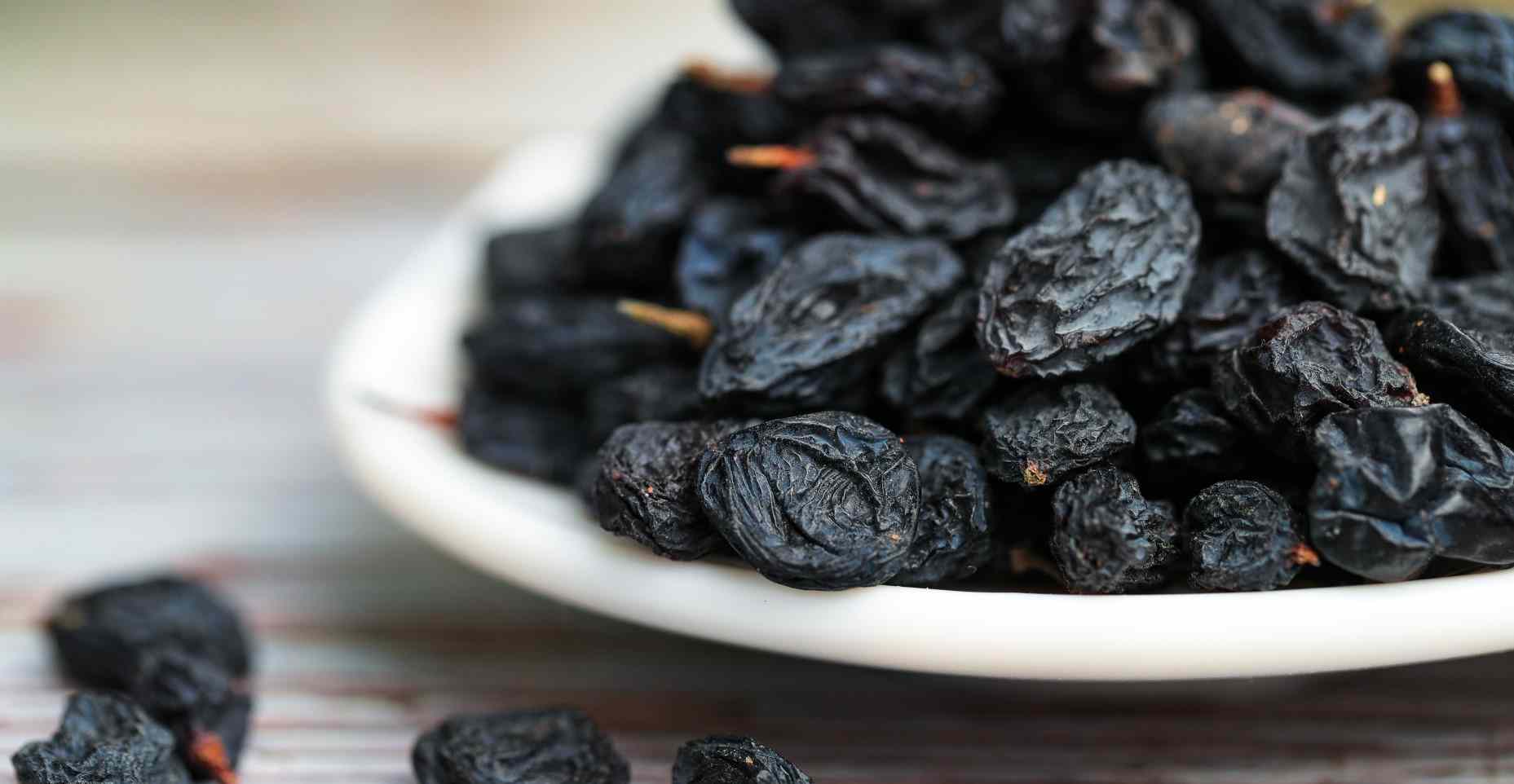
- Magnesium 32 mg
- Phosphorus 101 mg
- Potassium 749 mg
- Copper 0.4 mg
- Vitamin B1 and B2 0.2 mg
- Sodium 11 mg
- Zinc 0.22 mg
- Vitamin C 2.3 mg
- Thiamine 0.106 mg
- Riboflavin 0.125 mg
- Niacin 0.766 mg
- Vitamin B6 0.174 mg
- Folate 5 micrograms
- Fat 0.5 mg
- Manganese 0.3 mg
- Vitamin E 0.12 mg
- Vitamin K 3.5 micrograms
- Reduces stomach acid
Raisins contain significant amounts of useful minerals such as iron, copper, magnesium, and potassium.
These minerals have alkaline properties on the pH scale and help to balance the acidity level in the stomach.
Reducing the risk of heart diseases with the properties of raisins Studies have shown that eating raisins regularly reduces cardiovascular risk factors such as blood pressure compared to other snacks.
Because raisins are low in sodium, and of course, they are a good source of potassium and help improve blood vessel function.
Fighting cancer cells Raisins are a good source of antioxidant compounds.
Antioxidants are essential because they can protect the body from free radicals.
Oxidative damage and free radicals are dangerous factors in many types of cancer, tumor growth, and aging.
Raisins protect the eyes Another property of raisins is to help eye health.
Raisins contain polyphenol; Antioxidants that protect eye cells from free radical damage.
This feature can help protect the eyes from eye-related disorders such as macular degeneration and cataracts.
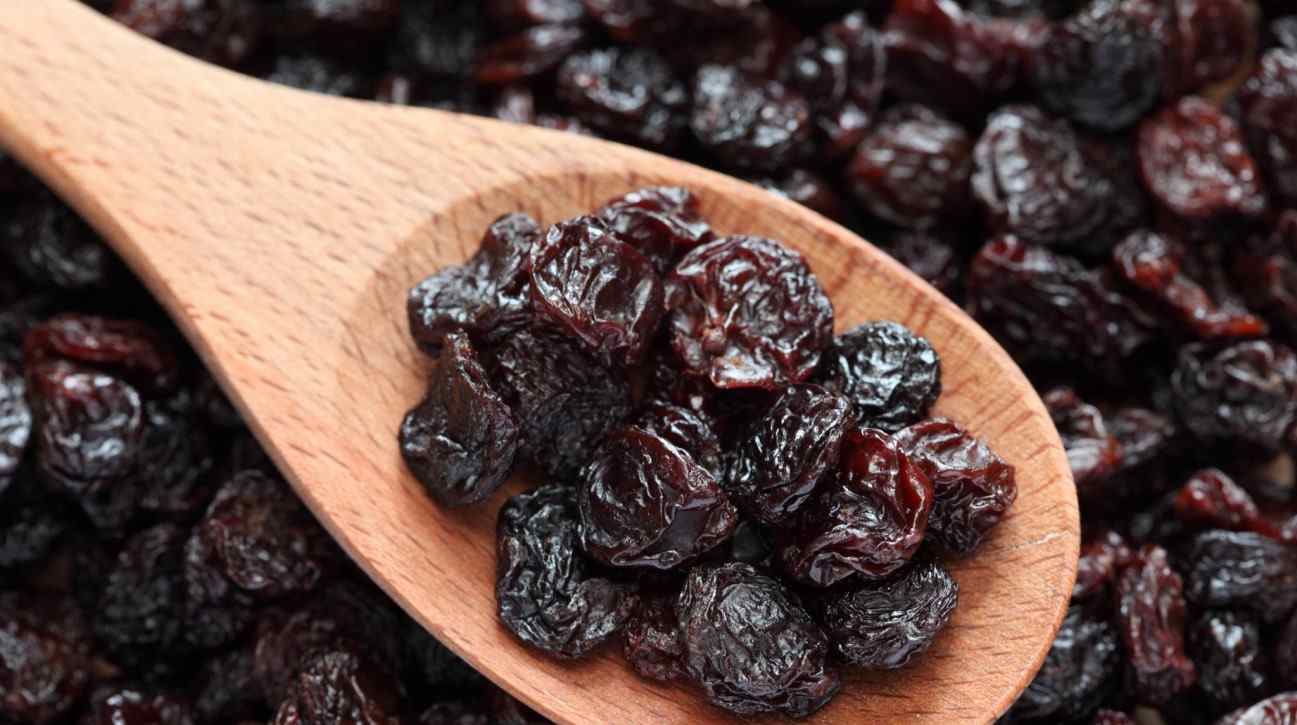
Black Raisins Nutrition
According to nutrition experts, black raisins are a good source of antioxidants.
Since raisins are dried grapes, they will have the same nutritional value as grapes; However, there are some exceptions.
For example, while both are good sources of certain antioxidants, raisins may contain higher amounts of antioxidants because the drying process preserves the antioxidants.
Drying also significantly reduces vitamin-C content.
The results of a research study in the Journal of Nutritional Health show that raisins have very high amounts of antioxidants and phenols compared to other popular dried fruits.
In particular, raisins are a good source of antioxidants called flavanol glycosides and phenolic acids, and their ORAC value is about 3400.
ORAC stands for oxygen radical absorbance and shows the number of antioxidants in food.
This study states that the body can effectively use the antioxidants in raisins and turn them into a simple and effective source of dietary antioxidants.
Raisins are the result of removing moisture from grapes.
Standard raisins are usually obtained from seedless grapes, although it is possible to produce raisins from most grapes.
Although store-bought raisins are generally all-natural and inexpensive, and organic ones are also available, some people prefer to make their own.
Fortunately, it is simple and easy to prepare raisins using an oven or fruit drying machine.
Raisins can be a simple way to add fruit, healthy nutrients, and antioxidants to your diet.
Due to the properties of raisins, eating them regularly can help the health of the body and prevent some disorders.
However, moderation in eating raisins is very important because they are high in sugar and calories, and this point is important for people who are trying to lose weight.
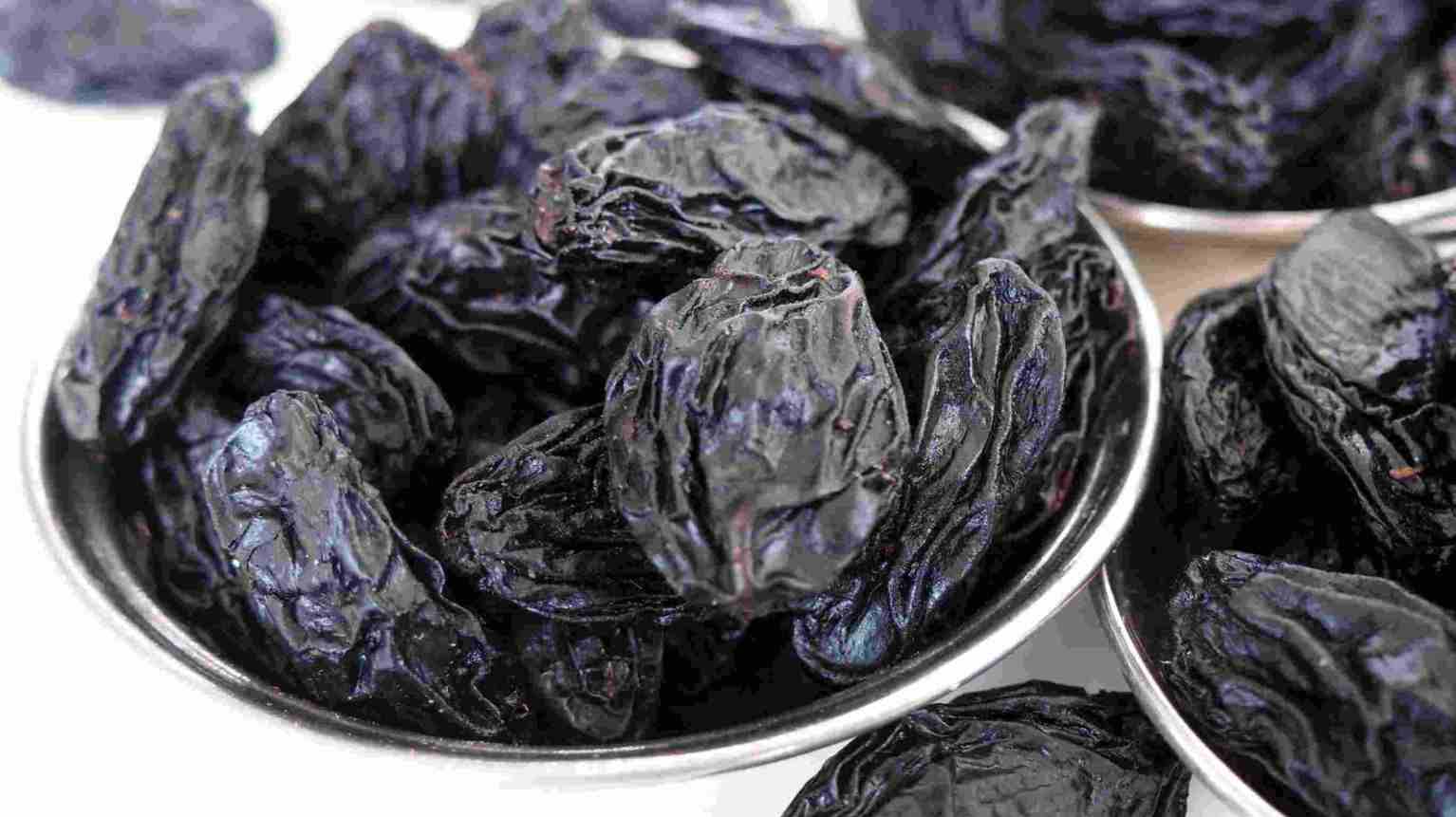
Black Raisins Nutrition Facts 100G
Some nutrition facts about black raisins show what kind of minerals are in every 100g of them.
Nutritional value of raisins 14 grams of seedless raisins the amount of 42 calories 11 grams of carbohydrates Fiber 0.6 grams Protein 0.5 grams Sugar 9.1 grams Sodium 3.6 mg Calories in one raisin: 2 Calories in 100 grams of raisins: 299 Calories in 100 grams of cooked raisins: 219.
100 grams of green raisins the amount of 325 calories Carbohydrate 77.5 grams 5 grams of fiber Protein 2.5 grams Sugar 72.5 grams Potassium 775 mg Calories in one tablespoon of green raisins: 32
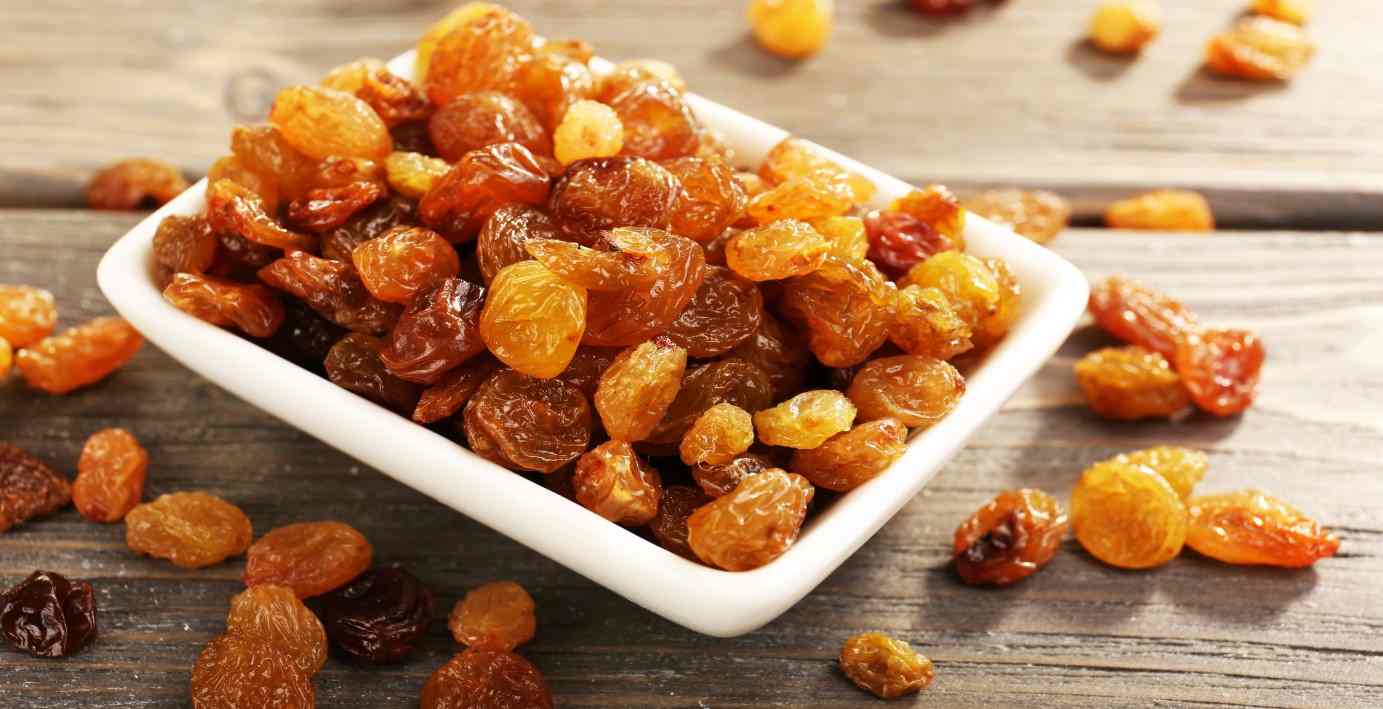
Nutritional Value of Golden Raisins
100 grams of golden raisins the amount of 302 calories Carbohydrate 79.5 grams 4 grams of fiber Protein 3.4 grams Sugar 59.2 grams Potassium 746 mg Calories in one cup of golden raisins: 29 Raisins have 11 grams of carbohydrates per 14 grams, while fresh American grapes have 2.5 grams of carbohydrates per 14 grams.
Depending on the type, grapes have fewer calories and fiber than raisins.
Raisins with seeds provide more fiber with similar amounts of carbohydrates and calories.
While raisins are rich in carbohydrates, their sugar is mostly fructose, which has a lower glycemic index.
The glycemic index of raisins is in the low to medium range, but eating too many raisins can lead to increased blood sugar in people with diabetes because raisins have a significant amount of carbohydrates per serving.
Vitamins and minerals 28 grams of raisins provide 4% of your daily need for potassium.
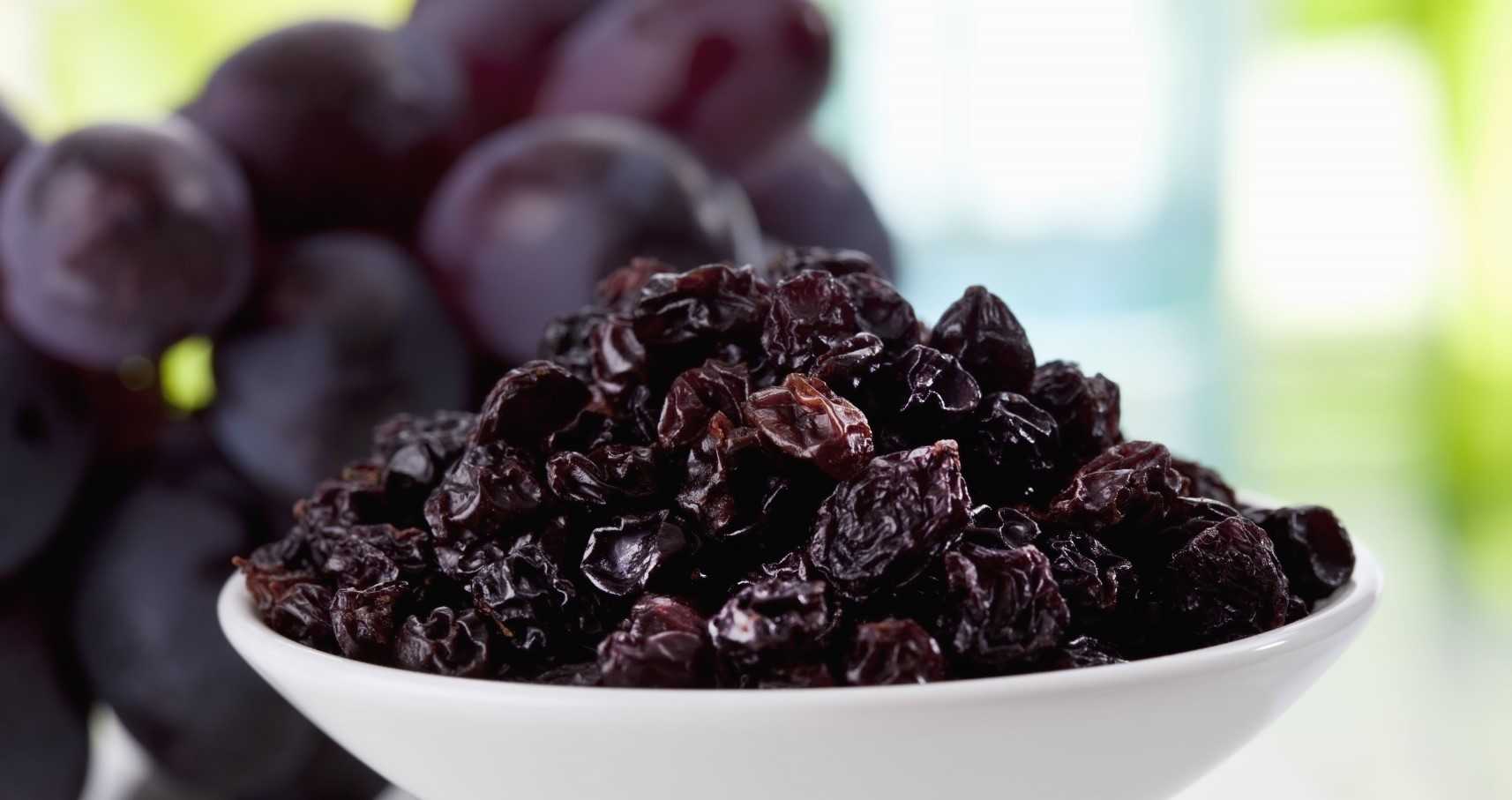
Nutritional Benefits of Black Raisins
Black raisins have minerals and vitamins.
These materials have nutritional benefits for our health.
A rich source of nutrients Both walnuts and raisins are rich in vitamins, minerals, and antioxidant compounds.
The most important minerals in raisins are iron, calcium, and bromine.
Walnuts are also a rich source of omega-3 fatty acids, copper, folic acid, phosphorus, manganese, and vitamin E and B6.
Using these two compounds as a snack can help strengthen the body.
Help control weight Using walnuts and raisins can be suitable for weight control.
Studies show that raisins are high in fiber and help in better digestion.
Also, the consumption of this combination causes people to feel full for a long time.
On the other hand, walnuts help control appetite and control weight.
Therefore, the use of walnuts and raisins, in addition to providing nutritional needs, also plays a role in weight control.
Blood lipid control Another unique property of the combination of raisins and walnuts is to help reduce bad blood fat or LDL.
The fiber in raisins can help reduce blood fat.
Also, studies show that consuming walnuts in the diet can be effective in reducing total cholesterol, LDL cholesterol, and blood triglycerides.
Cancer prevention The presence of many antioxidant compounds inside walnuts and raisins such as ellagic acid, polyphenols, and tocopherol protects the body against free radicals.
Researches show that walnuts are rich in polyphenol ellagitannin, which is converted into ornithine in the intestine and protects the intestine from cancer.
On the other hand, ornithine has hormone-like properties and blocks hormone receptors in the body, and reduces the risk of hormone-related cancers, such as breast and prostate cancer.

Black Raisins Are Rich In
Black raisins are rich in some minerals which are necessary for the body.
Raisins are rich in potassium, which regularly prevents the formation and recurrence of kidney stones and their failure.
If you eat some raisins every day, digestion and digestion will improve, because raisins have fiber that can swell in contact with water.
This helps in better digestion and treatment of constipation.
Raisins contain fructose and glucose, and these substances can be very strong in bodybuilding, strengthen muscles and provide the energy needed for exercise.
Raisins are rich in strong antioxidants with anti-inflammatory and body-strengthening properties, as well as polyphenolic nutrients, which are very useful in curing infections caused by colds.
Raisins contain phytochemicals that contain phenols that can treat fever by fighting viral and bacterial infections due to their antimicrobial, antibacterial, and antioxidant properties.
The iron in raisins is very useful for treating insomnia because it improves the quality of people's sleep.
Raisins contain a large amount of vitamin C, which facilitates the absorption of minerals and nourishes the body and hair, thus helping to maintain the natural color of the hair.
Raisins contain plant nutrients called boron and oleanolic acid, which can be useful in protecting the skin from the harsh rays of the sun and protect the skin from the inside.
The presence of strong antioxidants in raisins accelerates the skin repair system and makes the skin plump and firm.
Raisins contain natural sugar and regulate blood sugar, of course, people with low blood sugar can benefit greatly from raisins.
Due to the warm nature of raisins, this dried fruit and its various compounds are very useful in the treatment of rheumatism, joint pain, and sciatica.
In general, eating raisins is expectorant, and by eating two to three handfuls a day, it can be used to treat whooping cough.

Facts about Black Raisins
There are some myths and facts about black raisins.
Improve skin health with raisins; Antioxidants help keep skin cells young and prevent cell damage and aging.
Among other properties of raisins are valuable nutrients such as vitamin C, selenium, and zinc.
This combination of nutrients and antioxidants, in addition to helping the diet, affects the health of the skin.
Reducing blood sugar by eating raisins Medical studies show that eating raisins regularly leads to a decrease in blood sugar in people compared to eating other snacks.
Although one of the properties of raisins is its sugar, its consumption reduces glycosylated hemoglobin, which is a sign of blood sugar management, compared to processed snacks.
In other words, a meal containing raisins is effective in controlling and eliminating cravings for other sweets.
Is it dangerous to eat raisins?
Although raisins are generally healthy, sometimes they are not the best snack.
For example, people who are looking to get a few calories should be careful in eating large amounts of raisins.
One of the properties of raisins is that they have the same number of calories as grapes, although they are much smaller.
So, eating too many raisins can easily lead to high-calorie intake.
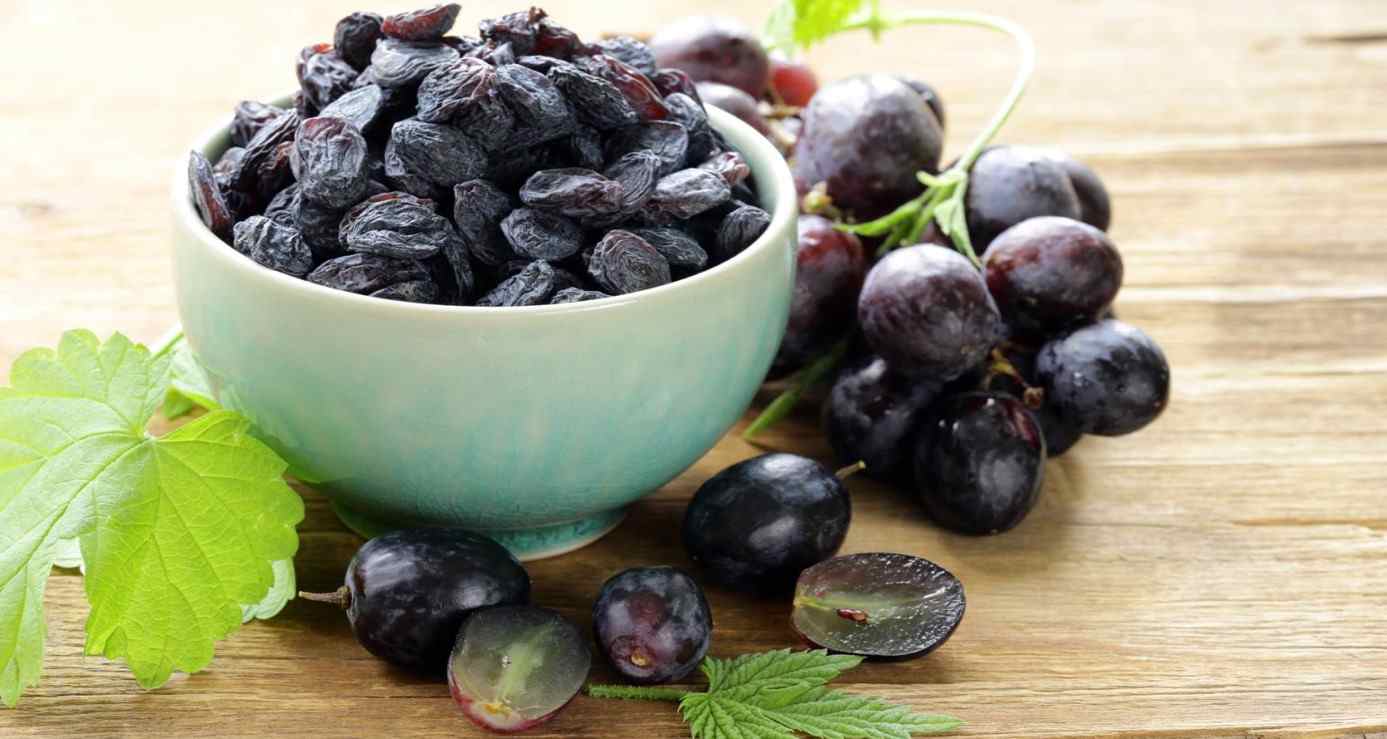
Another problem with too many raisins is the increase in soluble fiber.
Too much fiber may cause digestive system discomfort such as cramping, gas, and bloating, and in some people, it may even cause diarrhea.
However, it should be noted that these effects only occur if raisins are consumed in high amounts, because this food item does not have a lot of fiber.
Finally, due to the small size of the raisin, it may cause suffocation in children or people prone to suffocation.
As a result, it is better for these people to use fresh fruits instead of raisins.

1
0